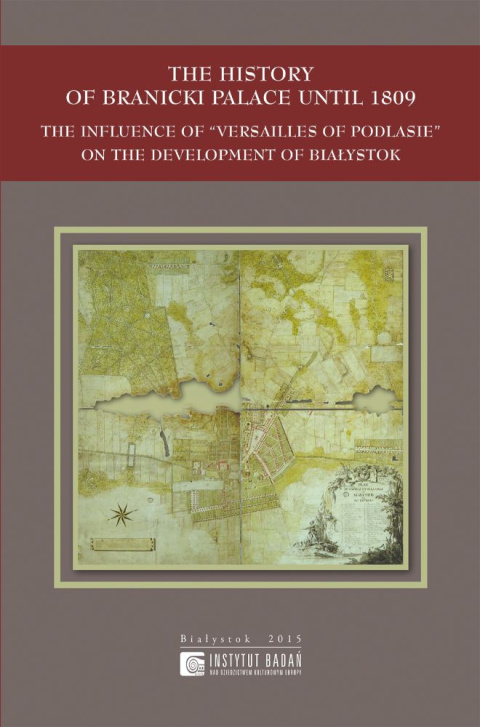-
Koszyk jest pusty
-
x

-
Koszyk jest pusty
-
x
- Kategorie
-
The History of Branicki Palace until 1809. The influence of - Versailles of Podlasie - on the Development of Białystok


| Wysyłka w ciągu | 24 godziny |
| Cena przesyłki | 11 |
| Dostępność |
Mała ilość
|
| Kod kreskowy | |
| ISBN | 9788364103551 |
| EAN | 9788364103551 |
| Zostaw telefon |
Autorzy: Karol Łopatecki, Wojciech Walczak
Rok wydania: 2015
Liczba stron: 247
Okładka: twarda
Format: 17,00 cm x 24,00 cm
Seria: Disertationes 9
The state called the Polish-Lithuanian Commonwealth was formed as a result of a merger of the Kingdom of Poland and the Grand Duchy of Lithuania. It took place during the general sejm in Lublin in 1569, ending the period of casual connection between these two states based on a personal union since the Union of Krewo of 1385.1 Shortly after, on 7th July 1572, the last Jagiellonian king,Zygmunt II August, died. This resulted in a long period of “Great Interregnum” (1572–1576). The rules of royal elections were then established: the king was to be elected by the Polish and Lithuanian nobility jointly. The principle of Electio viritim was applied, meaning that each nobleman was allowed to turn out to support one candidate. A special set of laws (the so-called Henrician Articles) to be confirmed by each newly elected king, was also prepared. These transformations strengthened the dominant position of the nobility in political life.
(fragment of the introduction)
Państwo zwane Rzeczpospolitą Obojga Narodów powstało w wyniku połączenia Królestwa Polskiego i Wielkiego Księstwa Litewskiego. Miało to miejsce na sejmie walnym w Lublinie w 1569 r., kończącym okres swobodnego związku między tymi dwoma państwami, opartego na unii personalnej od czasu unii krewskiej z 1385 r.1 Wkrótce potem, 7 lipca 1572 r., ostatni król jagielloński, zmarł Zygmunt II August. Zaowocowało to długim okresem „wielkiego bezkrólewia” (1572–1576). Ustalono wówczas zasady elekcji królewskiej: króla miała wybrać wspólnie szlachta polska i litewska. Zastosowano zasadę Electio viritim, co oznaczało, że każdy szlachcic mógł stanąć po stronie jednego kandydata. Przygotowano także specjalny zbiór praw (tzw. artykuły henrykowskie), które zatwierdzał każdy nowo wybrany król. Przemiany te umocniły dominującą pozycję szlachty w życiu politycznym.
(fragment wstępu)
Spis treści:
Introduction /7
1. Owners of the Białystok estates before 1809 /15
2. Białystok as a borderland area /25
3. Development of the Białystok estate /41
4. Establishment and development of the town of Białystok /53
5. Municipal authorities and judicature /75
6. Białystok as garrison town /87
7. The Białystok palace until the early 18th century /107
8. Jan Klemens Branicki - the originator of the Białystok palace and garden layout /121
9. Description of palace interiors (as of 1772) /141
10. The Białystok Palace under Izabela Branicka's administration /181
11. The Białystok estate under the sole administratio of Izabela Branicka (1771-1808) /193
Conclusion /211
Bibliography /217
List of Ilustrations /241
